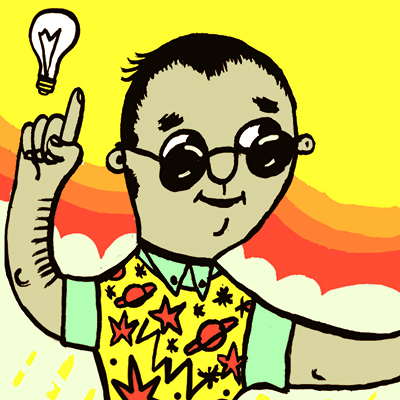Wojciech Mikołuszko
, b. 1974
Wojciech Mikołuszko (1974) graduated in biology, geology, and paleontology at the University of Warsaw, Poland. He was also a student of Szkoła Reportażu [School of the Documentary] at the Collegium Civitas in Warsaw (currently Postgraduate Studies at the Laboratory of the Documentary, Faculty of Journalism, Information and Book Studies, University of Warsaw). For some time he worked at the Polish Academy of Sciences Museum of the Earth in Warsaw, but from 2000 he has been working as a journalist and author focused on promoting science among both adults and children. He published such books as Wielkie pytania małych ludzi [Great Questions of Small People], Wielkie eksperymenty dla małych ludzi [Great Experiments for Small People] and series with Tata [Dad]: Tato, a dlaczego? [Dad, why?]; Tato, a po co? [Dad, what for?]; Z tatą w przyrodę [With Dad into Nature], Z tatą na dinozaury [With Dad Looking for Dinosaurs]. He was also a co-author of textbooks for elementary schools called Tropiciele [Trackers]. He has two blogs: adlaczego.blogspot.com and wprzyrode.blogspot.com. More on Mikołuszko at his official page: mikoluszko.com (accessed: January 10, 2019).
Bio prepared by Krzysztof Rybak, University of Warsaw, rybak.km@gmail.com
Questionnaire
1. What drew you to working with Classical Antiquity and what challenges did you face in selecting, representing, or adapting particular myths or stories?
My book is about science and science – as we know it today – started in ancient Greece. Then it was part of philosophy (and I regret that now philosophy and science are separated). So it was obvious to me that I have to describe a story from the ancient time. Also Archimedes was an obvious choice since he is considered today the father of experimental sciences and this particular book was devoted to experiments. Until today his exclamation "Eureka!" is a symbol of making a discovery – especially through experiments – and is used in science all over the world.
2. Why do you think classical / ancient myths, history, and literature continue to resonate with young audiences?
I write about science for kids. And as I said before – the roots of modern science are in the classical history. When the modern science emerged in 17th century the researchers struggled with classical opinions – both in good and bad meaning of the terms. They "inherited" the logic and basic concepts of ancient Greece and Rome but they had to discard false beliefs of Aristotle or Galen of Pergamon. It took them a lot of time and effort. Also the ancient history is full of interesting stories that can make kids engaged in science – like naked Archimedes running through the town and shouting "Eureka! Eureka!". It is funny and children feel lots of emotions reading it.
3. Do you have a background in classical education (Latin or Greek at school or classes at the University?) What sources are you using? Scholarly work? Wikipedia? Are there any books that made an impact on you in this respect?
No, I don't have such a background. I use both internet sources and books. Of course, I do use Wikipedia but as a starting point and then verify the information. For writing the story about Archimedes I used: (1) Księga odkryć [Book of Discoveries] (1987) by Bolesław Orłowski and Zbigniew Przyrowski, (2) Technika [Technology] by Bolesław Orłowski (published by Ossolineum in 1999), (3) Historia nauk przyrodniczych w zarysie [An Illustrated History of Science] by F. Sherwood Taylor from 1955.
4. Did you think about how Classical Antiquity would translate for young readers, esp. in Poland?
I have no opinion on that for now. I would have to think it over.
5. How concerned were you with "accuracy" or "fidelity" to the original? (another way of saying that might be—that I think writers are often more ‘faithful’ to originals in adapting its spirit rather than being tied down at the level of detail—is this something you thought about?)
I am concerned but I am not able to verify the original sources. I used books by good historians of science and I trusted them. However, I am aware that also they could use "secondary" sources. I appreciate prof. Bolesław Orłowski a lot, I used to know him personally, but I doubt if he spoke Greek – but I haven't checked it, to be honest.
6. Are you planning any further forays into classical material?
Now I am not working on any such a story. Maybe if I write another book about the history of science I would include some classical material.
Prepared by Krzysztof Rybak, University of Warsaw, rybak.km@gmail.com
Records in database:



